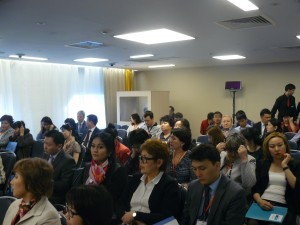 ASTANA – A seminar on automated human resource management systems in the public sector was held recently at the National Centre for Civil Service Personnel Management. The seminar was supported by the Agency for Civil Service Affairs of the Republic of Kazakhstan and the European Union-funded project “Civil Service Reform and Modernisation of the Government of Kazakhstan”.
ASTANA – A seminar on automated human resource management systems in the public sector was held recently at the National Centre for Civil Service Personnel Management. The seminar was supported by the Agency for Civil Service Affairs of the Republic of Kazakhstan and the European Union-funded project “Civil Service Reform and Modernisation of the Government of Kazakhstan”.
In his welcoming speech, Chairman of the Agency for Civil Service Affairs of the Republic of Kazakhstan Alikhan Baimenov noted that the introduction of up-to-date personnel and information technologies is a factor in improving the quality of human resources management. Therefore, it is planned to complete the e-kyzmet personnel management integrated information system by the end of 2015. It incorporates the best aspects of similar programmes from around the world. The EU project drew international experts to the seminar, including Sylvia Bronmans, chief executive officer of the Dutch government company P-Direkt, who has experience in public sector personnel processes automation in the Netherlands. She spoke about the basic functions and efforts of the P-Direkt system, which is the most advanced European model for centralising generic functions of central government bodies.
P-Direkt is a Dutch government agency that was designed to centralise and standardise the human resources processes of 10 ministries. Maximilian Foedinger, the key expert of the EU Project, also covered issues on international practices regarding the automation of human resource management systems in the civil service.
“We are an EU-financed project and our main task is to improve civil services,” Foedinger said in an interview with The Astana Times.
He further explained that one of the key components of the programme is e-kyzmet.
Foedinger is an Austrian expert with more than 23 years experience in consulting public and private entities in Eastern Europe, the Commonwealth of Independent States (CIS) and the Middle East. During his career, he has advised numerous state bodies, including ministries, agencies and regional and municipal administrations. His core specialties are restructuring, innovation and research cooperation, regional development and export promotion.
“This will be a system which will manage all human resource operations in Kazakhstan’s civil service,” Foedinger said.
“Of course, this is a huge task. [We try] to find the best European practices and bring them to Kazakhstan as part of the learning process and to find ways of saving money,” he said, calling P-Direkt one of the leading European experts in the field.
“We visited the UK, Germany, Hungary, Austria, Poland, etc., and out of all of the organisations we visited, P-Direkt was the one with the most suitable criteria,” Foedinger said.
Foedinger went on to explain that HR in the former Soviet states and the CIS has been neglected, but he underlined that slowly the importance of human resources is being realised and given more attention, especially in Kazakhstan.
“It’s not only the natural resources you have here. The government [now] understands that the most important natural resources are not gas and oil, but human resources. It’s about people that have the power to either let a country fail or succeed,” Foedinger said.
“Why is the EU financing the programme? The answer is really very simple. Business can be done in a strong economy; while under a weak one, nothing can be done. Look at Europe after World War II, there was nothing left. Everything was destroyed. Look at Europe now; they had a plan to rebuild and did just that. If you rebuild somebody, you can do business with them. In regards to Kazakhstan, the country doesn’t need rebuilding, but rather strengthening,” Foedinger said. This is one of the reasons, according to him, why agencies like P-Direkt are here today to share their knowledge.
With the centralisation and automation of HR functions, HR managers will have more time and energy for dealing with strategic issues. Foedinger also sees this as a chance to constantly improve and upgrade people’s skills and qualifications.
Foedinger stated that the overall budget of the project is 4.2 million Euros (US$5.8 million), which have been allocated over 48 months.
The seminar was attended by representatives of the personnel management services of more than 30 representatives of the government and heads of the IT Association of Kazakhstan. The recommendations elaborated upon during the seminar will be applied in the operations of government agencies.

